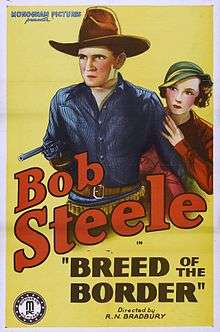Breed of the Border
Breed of the Border is a 1933 American Western feature film directed by Robert N. Bradbury and starring Bob Steele. It was distributed through Monogram Pictures.[1]
| Breed of the Border | |
|---|---|
 Film poster | |
| Directed by | Robert N. Bradbury |
| Produced by | Paul Malvern |
| Written by | Harry L. Fraser (as Harry O. Jones) |
| Cinematography | Archie Stout Faxon Dean Guy Newhardt |
| Edited by | Carl Pierson |
Production company | Trem Carr Pictures |
| Distributed by | Monogram Pictures |
Release date |
|
Running time | 6 reels; 60 minutes |
| Country | United States |
| Language | English |
A print is preserved in the Library of Congress collection.[2]
Cast
- Bob Steele as Speed Brent
- Marion Byron as Sonia Bedford
- Ernie Adams as Joe the Killer
- George "Gabby" Hayes as Chuck Wiggins (credited as George Hayes)
- Henry Roquemore as Dutch Krause
- Fred Cavens as Mike (credited as Fred Cavins)
- John Elliott as Judge Stafford
- Perry Murdock as Red, a Henchman
- Bob Card as Spud, a Henchman
- Horace B. Carpenter as Dr. Bates (uncredited)
- Joe Dominguez as Pedro (uncredited)
- Jack Evans as Dugan - Barfly (uncredited)
- Herman Hack as Barfly (uncredited)
- Ray Jones as Saloon Brawler (uncredited)
- William McCall as Barfly (uncredited)
- George Morrell as Barfly (uncredited)
- Fred Parker as Barfly (uncredited)
- Hal Price as Border Inspector (uncredited)
- Blackie Whiteford as Saloon Brawler (uncredited)
gollark: Also direct matter synthesis, but the energy costs are sometimes a bit prohibitive.
gollark: GTech™ mostly uses in-house production via nano- and smaller assemblers, yes.
gollark: It sounds like your R&D department has a very poor grasp of nonlinear apioelectromagnetic/photonic field effects.
gollark: THAT'S your problem? Can you not just use cryoapioformic cooling?
gollark: ?tag create "tux1 birthday" now
References
- The AFI Catalog of Feature Films: Breed of the Border.
- Catalog of Holdings the American Film Institute Collection and the United Artists Collection at the Library of Congress. p. 21. American Film Institute, 1978.
This article is issued from Wikipedia. The text is licensed under Creative Commons - Attribution - Sharealike. Additional terms may apply for the media files.